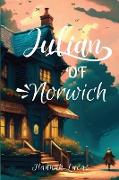Julian of Norwich
BücherAngebote / Angebote:
In the above quote from Chaucer's House of Fame, the Eagle repeats a standard invocation to St Julian the Hospitaller, patron saint of hospitality and travellers, to grant good lodging. The Eagle's petition attests to the continued popularity of the legend or romance of St Julian in the fourteenth century, a tale which describes a nobleman who, after receiving a prophecy that he would kill his parents, fled his home. Like Oedipus, Julian mistakenly fulfils the prophecy when his wife welcomes his parents into their castle, unbeknownst to him. After killing his parents, Julian enters a life of penitential solitude and service to the poor and the sick, establishing a hospice, and is later forgiven when he accommodates a dying leper, a disguised divine messenger, in his own bed. 4 Julian's story is told in Jacobus de Voragine's Legenda aurea and Giovanni Boccaccio's Decameron, while prayers to St Julian are reported in the South English Legendary, to be performed by medieval travellers hoping for a hospitable journey-specifically 'Iulianes Pater Noster', a Paternoster for Julian's parents which the saint enjoins on travellers who ask for his help.5 The second quote, from Sir Gawain and the Green Knight, is an entreaty of this kind, spoken by Gawain as he approaches Bertilak's castle. Here, the eponymous knight 'beseche[s]' the saint 'yette', implying he has already beseeched St Julian for 'bon hostel (presumably during the prayers he performed en route6 ), and will continue to do so until it is firmly granted. The 'yette' serves to extend the suspense of Gawain's reception at the castle, the irony being, of course, that Bertilak's residence will not prove 'bone hostel' for Gawain, despite the knight's best intentions to observe the customs of hospitality performed through the daily giftexchange
Folgt in ca. 15 Arbeitstagen
